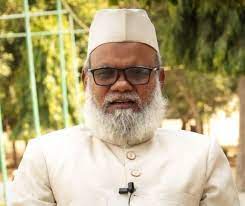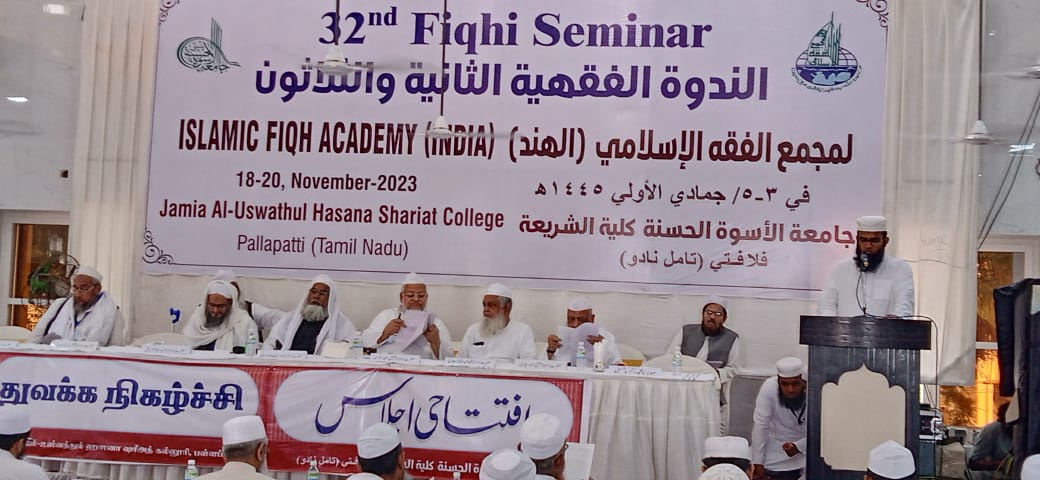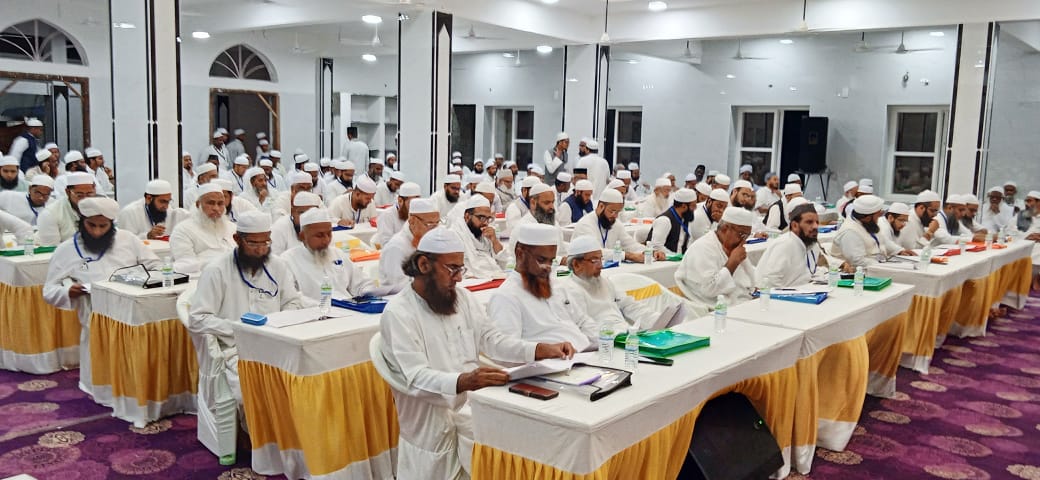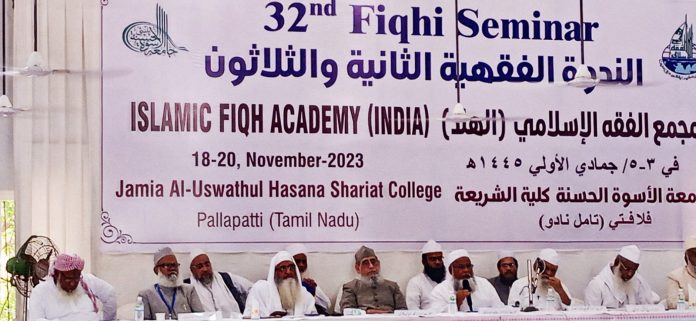
By Anwarulhaq Baig
New Delhi, Nov. 22: Nearly 300 eminent Islamic scholars and jurists from across the country have issued Sharia guidelines for Muslims pertaining to the imitation of identities, symbols or practices of other religions, unlawful earning and wealth, and modern investment practices at the 32nd jurisprudential seminar organized by Islamic Fiqh Academy (IFA), India. In the annual seminar held at Jamia Al-Uswathul Hasana Sharia College in Pallapatti, Tamil Nadu, from Nov. 18 to 20, the Islamic scholars and muftis, representing reputed institutions and organizations, adopted recommendations on these three key issues after thorough deliberations.
 Dr. Mohammed Raziul Islam Nadvi, Secretary of Sharia Council, Jamaat-e-Islami Hind, who attended the seminar, told Radiance that the recommendations provided guidance for Muslims in accordance with Islamic Sharia on the prevailing contemporary investment practices and means in India, the appropriate approach for individuals possessing ill-gotten wealth, and the impermissibility of imitating the customs and identities of other faiths.
Dr. Mohammed Raziul Islam Nadvi, Secretary of Sharia Council, Jamaat-e-Islami Hind, who attended the seminar, told Radiance that the recommendations provided guidance for Muslims in accordance with Islamic Sharia on the prevailing contemporary investment practices and means in India, the appropriate approach for individuals possessing ill-gotten wealth, and the impermissibility of imitating the customs and identities of other faiths.
Dr. Raziul Islam informed that IFA organizes lectures and seminars to explore Sharia-based solutions to contemporary Muslim challenges. Its annual Fiqhi (jurisprudential) seminars played a vital role in offering guidance to common Muslims on emerging issues, including modern educational institutions, animal rights, environment, government schemes, rights of elderly and disabled persons, rights of children, ecological conservation, halal and haram food ingredients, halal certificate, Islamic Banking, bank Interest, insurance, trade in gold and silver, bond, currency, bank cards, educational loans, network marketing, e-commerce, organ donation, plastic surgery, women’s employment, sex education, euthanasia, DNA test, genetic science, drugs, mechanical slaughtering, and birth control.
To date, 32 annual seminars have been held in various cities across the country on various issues. According to Dr. Nadvi, through collective deliberations, despite diverse opinions among scholars, the academy strives for a balanced approach, utilizing the collective consensus (ijtihad) and majority opinion of jurists, in addressing critical issues confronting the Muslim community by applying Islamic jurisprudence principles derived from the Quran and Sunnah.
 Talking about the whole process of conducting a fiqhi seminar, Dr. Nadvi explained that the academy’s methodology involves selecting seminar topics, soliciting scholars’ opinions, preparing questionnaires, and distributing abridged papers to the eminent participants. According him, selected scholars present their papers on issues in the seminar, followed by open discussions.
Talking about the whole process of conducting a fiqhi seminar, Dr. Nadvi explained that the academy’s methodology involves selecting seminar topics, soliciting scholars’ opinions, preparing questionnaires, and distributing abridged papers to the eminent participants. According him, selected scholars present their papers on issues in the seminar, followed by open discussions.
“Subsequently, a committee is formed to compile recommendations based on the opinions and discussions. While the opinions expressed in the papers vary considerably, with some participants presenting inappropriate or extreme views, the committee members make it moderate and in accordance with the needs,” he added. Regarding the current seminar, Dr. Nadvi described all the decisions made in the 32nd seminar as overall appropriate.
Islamic ruling on imitation of Non-Muslims
Emphasizing Islamic guidance for Muslims to preserve their religious and cultural identity while avoiding practices from other communities or cultures that may compromise their religious beliefs, scholars and jurists in their recommendations have defined imitation as the conscious adoption of distinct characteristics specific to a particular community or civilization by individuals or groups of Muslims. However, they clarified that commonly accepted practices, not explicitly prohibited in Islam, do not fall under the category of imitation, which is impermissible. They added that imitation is permissible in matters pertaining to inventions and essential aspects of daily life.
Islamic scholars asked Muslims to refrain from adopting symbols or practices associated with other religions such as hanging a cross, wearing a sacred thread, applying tilak or colored markings on the forehead, celebrating Holi, lighting lamps during Diwali, participating in Christmas festivities, practicing yoga, or engaging in similar rituals. They mentioned that Saraswati Vandana, Surya Namaskar, Vande Mataram, reciting idolatrous prayers from the Bible or the Gita, folding hands in front of deities, or chanting their names, standing with folded hands in front of the statue or photo of Jesus Christ, all these are rituals of other religions. According to them, embracing all such ritual, practices and symbols is not permissible for Muslims, and they cautioned that matters related to beliefs, worship, or religious customs and traditions fall under imitation which could potentially undermine their faith.
Emphasizing that attire should adhere to the principles of modesty and avoid imitating the prevalent dress codes of other religions, Islamic scholars opined that sarees and dhotis are permissible garments in regions where they are not the customary attire of non-Muslims, but they should be modest and not cause confusion with non-Muslim attire. “Similarly, coat, pants and ties, which are no longer exclusively associated with any particular religion, are also considered acceptable attire,” said the scholars.
 The scholars advised Muslims to refrain from celebrating the New Year, children’s birthdays, wedding anniversaries, and similar events, labeling them as un-Islamic practices while they strictly prohibited celebrating April Fool’s Day due to its basis in deception and falsehood. They asked Muslim women not to imitate men by cutting their hair short.
The scholars advised Muslims to refrain from celebrating the New Year, children’s birthdays, wedding anniversaries, and similar events, labeling them as un-Islamic practices while they strictly prohibited celebrating April Fool’s Day due to its basis in deception and falsehood. They asked Muslim women not to imitate men by cutting their hair short.
Recommendations regarding unlawful earnings and wealth
The scholars unequivocally declared that any wealth acquired through unlawful means, such as usury, extortion, bribery, fraud, theft, gambling, or illicit contracts, is unquestionably forbidden.
Urging Muslims to refrain from haram or unlawful earnings and wealth, they recommend that if a person possesses any wealth obtained through unlawful means, he or she should return it to the rightful owner. They add that if it is not feasible for them, they should donate it to the poor or needy as charity, emphasizing that it is obligatory for every Muslim to cleanse themselves of such impure wealth.
Similarly, if such wealth is acquired through inheritance and the rightful owner is known, it is obligatory for a Muslim to return it to them. If the rightful owner is unknown or even if known, but returning it is not feasible, it is mandatory to distribute this wealth among the poor, according to scholars.
In another instance, involving inherited wealth, scholars maintain that if an heir utilizes unlawfully inherited wealth for business purposes, the profits generated will be considered legitimate. However, it is imperative for him or her to donate an amount equivalent to the unlawful wealth to charity.
Scholars permit housewives to utilize their husband’s or son’s earning only in situations of extreme financial hardship if the income is unlawful. They say, “If the husband’s or son’s entire or the majority of their income comes from unlawful sources, and if no other means are available to the woman, she is permitted to utilize the wealth of the husband or son in such dire circumstances.”
Acknowledging the significance of rectifying and compensating for past wrongdoings as a form of repentance, scholars maintain that if an individual has benefited from unlawful wealth to pursue education and subsequently engages in a lawful profession, the income earned from that occupation is deemed lawful. However, it is preferable for that person to give charity equivalent to the unlawful amount as a means of repentance.
Muftis and scholars further advise that if an individual possesses unlawfully obtained wealth and wants to engage in a lawful business venture but is unable to get a non-interest-based loan and faces extraordinary hardship in donating the entire amount to charity, engaging in business with such wealth is permissible. However, the obligation to dispense the entire amount in charity remains and should be fulfilled as soon as practicable.
The jurists and scholars also clarified that employment involving both lawful and unlawful sources and activities is not permissible.
Islamic financial guidelines
Urging Muslims to adopt the Islamic financial system of investment, which is based on the principles of profit-and-loss sharing partnerships rather than interest, the scholars’ recommendations also deemed it impermissible to utilize interest-based funds for any form of personal gain.
It should be noted that paying or charging interest in any form is strictly prohibited under Islamic law.
Suggesting different forms of investment within the Islamic framework, the scholars allowed the Continuous Mudarabah, a type of business investment contract in which the term of the contract is not fixed and new investors can enter in the middle of the year and investors can withdraw their capital and profit according to the situation. Mudarabah is a well-known form of Islamic business contract in which one party brings capital and the other personal effort or expertise on a profit-loss sharing basis. The proposal allows for the contract to be open-ended, so that new investors can enter and exit as they see fit.
They also declared ‘estimated reduction’, the practice of estimating the value of a company’s cash assets and fixed assets to determine profit and loss, which is prevalent in non-interest financial institutions as permissible. Under this method, the value of a company’s assets is estimated at the beginning of the year and at the end of the year. The difference between the two estimates is used to determine profit or loss.
Affirming the legitimacy of granting a company the status of a legal person and transacting with it as a Mudarib (working partner) or Rabbul Mal (investor), the jurists also endorsed the concept of a ‘legal person’.
The scholars also allowed ‘Diminishing Musharaka’, a term commonly used in current non-interest financial institutions for financing fixed and movable assets, long-term projects, and similar endeavors. They explained, “It’s permissible to jointly purchase something with a financial institution or individual, then rent the partner’s share, and gradually become the owner of their share by paying more money and agreeing to reduce the rent in proportion to the ownership, which is called Diminishing Musharaka.”
The inaugural session was presided over by Maulana Khalid Saifullah Rahmani, the academy’s General Secretary and the President of All India Muslim Personnel Board. In his address, he raised concerns about the active efforts of communal forces to assimilate Muslims into their ideology and well-planned conspiracies aimed at alienating Muslims from their faith.
Other sessions were chaired by Maulana Atiq Ahmed Bastawi, Maulana Ubaidullah Asadi, and Mufti Ahmed Sahab Devla.
The concluding session was presided over by Maulana Muhammad Sufyan Qasmi, the academy’s Vice President, and Reactor of Darul Uloom Waqf Deoband. In his address, he urged scholars to stay abreast of current affairs, situations and information to effectively fulfill their duty of interpreting and defending Islam.
In the seminar, participants expressed solidarity with the oppressed people of Palestine, pledging support for their efforts to liberate their land. Condemning Israel’s actions as unjust and barbaric, they highlighted India’s consistent support for the oppressed Palestinians, from the time of Gandhiji to the present day with the central government and opposition parties continue to uphold the same stance.
Representatives from reputed institutions and organizations such as Jamaat-e-Islami Hind, Darul Uloom Deoband, Nadwatul Ulama Lucknow, Mazahirul Uloom Saharanpur, Darul Islam Omarabad, Imarat-e-Shariah Bihar, Madrasa Al-Baqiyat-us-Salihat, Vellore, participated in the seminar.




